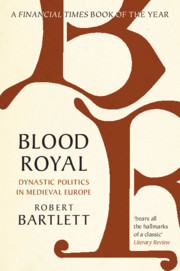Book contents
- Blood Royal
- The James Lydon Lectures in Medieval History and Culture
- Blood Royal
- Copyright page
- Dedication
- Contents
- Figures
- Preface and Acknowledgements
- Abbreviations
- Introduction Royal Families
- Part I The Life Cycle
- Part II A Sense of Dynasty
- Chapter 8 Names and Numbering
- Chapter 9 Saints, Images, Heraldry, Family Trees
- Chapter 10 Responses to Dynastic Uncertainty: Prophecy and Astrology
- Chapter 11 Pretenders and Returners: Dynastic Imposters in the Middle Ages
- Chapter 12 New Families and New Kingdoms
- Chapter 13 Dynasties and the Non-Dynastic World
- Conclusion
- Book part
- Notes
- Bibliography of Works Cited
- Index
Conclusion
from Part II - A Sense of Dynasty
Published online by Cambridge University Press: 09 July 2020
- Blood Royal
- The James Lydon Lectures in Medieval History and Culture
- Blood Royal
- Copyright page
- Dedication
- Contents
- Figures
- Preface and Acknowledgements
- Abbreviations
- Introduction Royal Families
- Part I The Life Cycle
- Part II A Sense of Dynasty
- Chapter 8 Names and Numbering
- Chapter 9 Saints, Images, Heraldry, Family Trees
- Chapter 10 Responses to Dynastic Uncertainty: Prophecy and Astrology
- Chapter 11 Pretenders and Returners: Dynastic Imposters in the Middle Ages
- Chapter 12 New Families and New Kingdoms
- Chapter 13 Dynasties and the Non-Dynastic World
- Conclusion
- Book part
- Notes
- Bibliography of Works Cited
- Index
Summary
So why did the dynastic system of political power come to an end? The first answer is that it didn’t completely. Apart from the few remaining countries where hereditary monarchs still exercise real political power, there have also been some modern dictatorships where sons have been groomed to step into their father’s shoes, as in the case of North Korea, and even in democracies there have been political dynasties producing recurrent presidents. Nevertheless, direct transmission of ruling power through inheritance has virtually disappeared. Office has been distinguished from property, the latter being quite legitimately transmitted on family lines, while the former cannot be. And this distinction was made during the period of the dynastic system. A French lawyer writing in 1419 puts it very clearly: ‘The lordship that the king has in the kingdom is of a different kind from the lordship of property that is transmitted through family inheritance.’
- Type
- Chapter
- Information
- Blood RoyalDynastic Politics in Medieval Europe, pp. 429 - 434Publisher: Cambridge University PressPrint publication year: 2020



